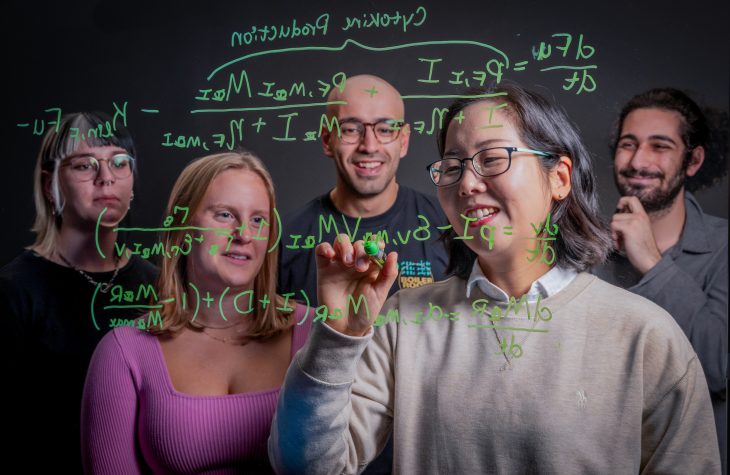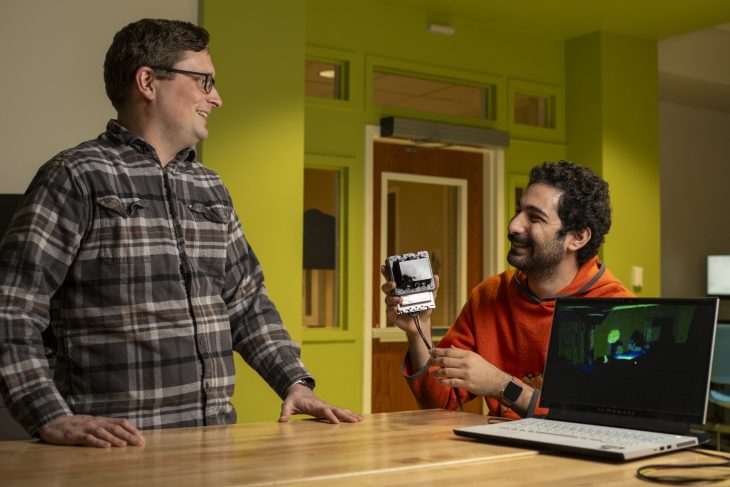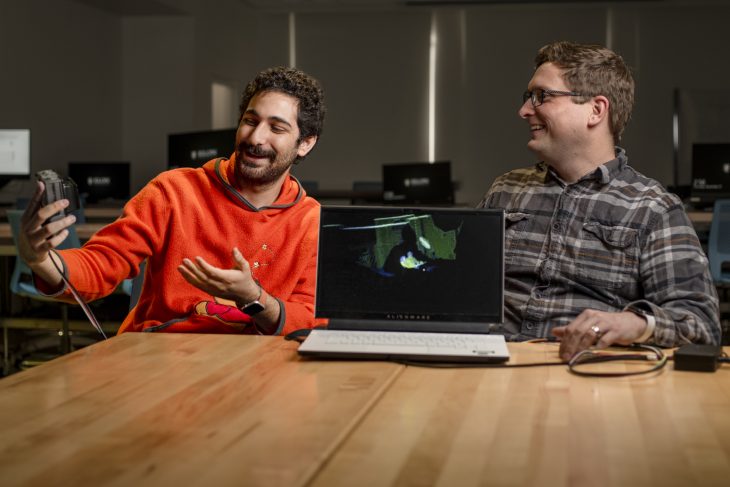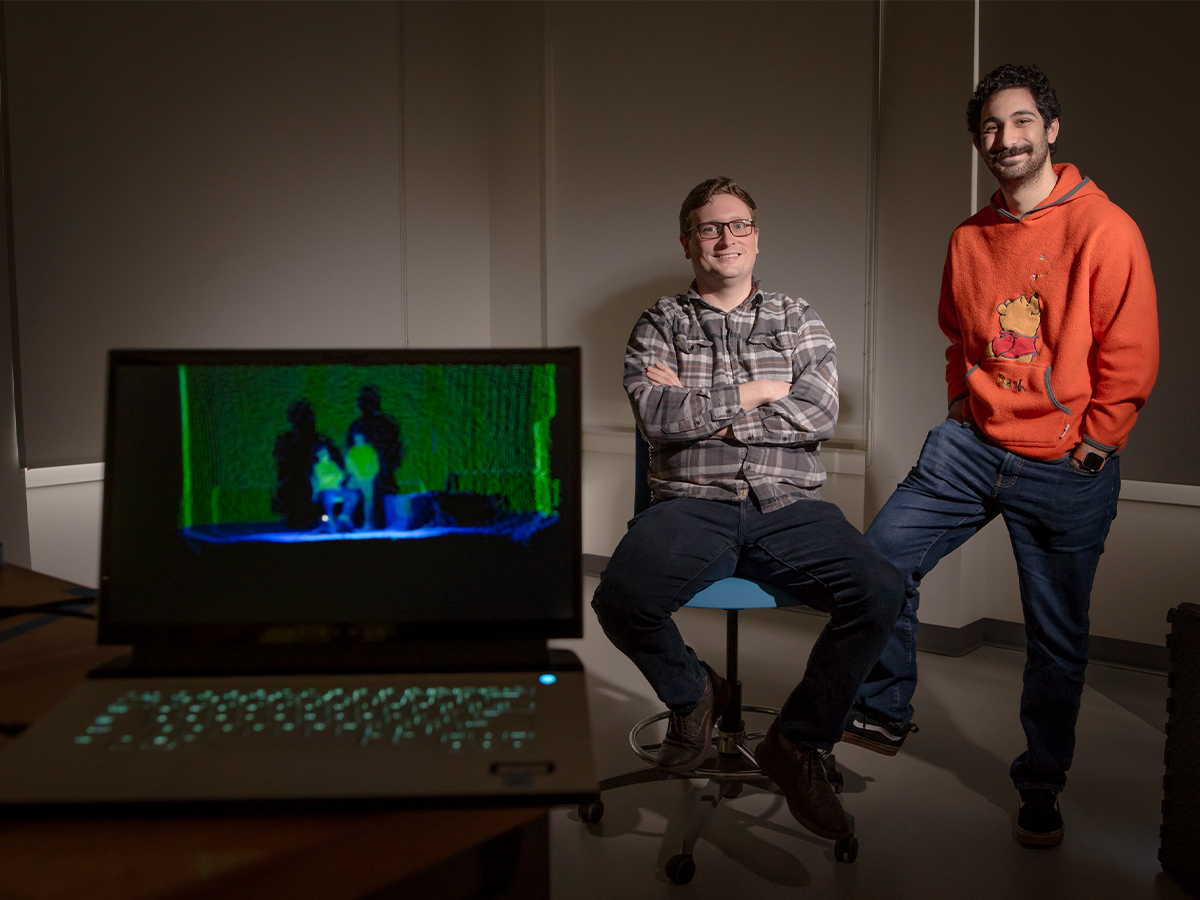Dahdal, a 2024 Lumen Scholar, is researching how to use LiDAR technology to gather vital signs from medical patients without touching them. It’s one of several research endeavors he has taken on throughout his time at Elon.
Rony Dahdal ’26 will be the first to admit that he has trouble narrowing down his interests. Triple majoring in computer science, mathematics and philosophy, Dahdal is now on his third research endeavor at Elon University – but they all have something in common.
“I see my research being applied to good humanitarian causes,” said Dahdal. “I find it very fulfilling when I’m looking at problems that matter.”
This spring, Dahdal was one of 15 students selected as a 2024 Lumen Scholar, the university’s top undergraduate research award. The award comes with $20,000 to help the students advance their academic and creative achievements, and Dahdal’s academic and creative achievements at Elon have been numerous. In addition to the Lumen Prize, he is also an Honors Fellow and was named a 2024 Goldwater Scholar, one of the most selective STEM awards in the country.
“I was shocked when I found out I got the Lumen Prize,” said Dahdal. “The main thing was I was grateful that there were people who saw my vision and cared enough to invest in me, not only academically but also in my personal growth to develop and learn.”
A sense of the unknown
Dahdal’s first research project at Elon involved working with Associate Professor of Mathematics Hwayeon Ryu on her National Science Foundation-funded research team, focusing on creating a mathematical model of complex equations that predict how the human immune system responds to COVID-19.

He then worked with Assistant Professor of Engineering Blake Hament on developing an autonomous robotic arm to monitor and tend to crops by training the 3D machine-learning model to understand plant anatomy.
“One thing about research is you’re trying to propel the current state of what we know,” said Dahdal. “You’re trying to find something that might not even exist. You’re trying to prove unknowns. There is this sense of the unknown that drew me in that I could contribute and inspire but also help the lives of others.”
For his Honors Program thesis and Lumen Prize research, Dahdal has now teamed up with Ryan Mattfeld, associate professor of computer science, on developing a method to gather medical vital signs, like heart rate, continuously without touching someone.
“What if you’re able to detect anomalies or sicknesses prior to a doctors visit,” asked Dahdal. “You would have much better insight into a patient’s health if you were able to continuously monitor these vital signs.”

LiDAR learning
Dahdal’s research proposes using LiDAR, a remote-sensing technology that uses laser beams to measure distances and movements, to detect these vital signs. His project is an intersection of all his previous work at Elon: using mathematical models for real-life implications with Ryu and using machine learning with Hament to solve a problem.
“Each experience with each mentor teaches you something a little different,” he said. “Each mentor pushes me to learn and understand rather than focus on progress. They don’t necessarily care if something works out, they just care that I’m developing as a researcher and developing toward my future goal.”
Mattfeld continues to be impressed with Dahdal’s work, noting that he is the most high-energy student he’s ever worked with.
“I was shocked when, as a sophomore, he was coming in with PowerPoint presentations describing papers that he’d read before coming to talk to me about the problem. I was blown away. Even having worked with a number of honors students before, it was impressive,” said Mattfeld.

The Elon investment
Education has always been important for Dahdal, whose family immigrated to the United States when he was 8 years old so they could have more educational opportunities. When he was looking at colleges, Elon’s commitment to mentorship between students and faculty was crucial.
“Elon is a school where the individual growth of a student is emphasized,” said Dahdal, who recalls doing research last summer at Carnegie Mellon, where he only had 30 minutes a week with faculty.
At Elon, he’s getting much more face-to-face time with faculty.
“You have professors who are invested in you and are there for you,” he said. “They are in support of you and that one-on-one connection allows you to be much more transparent about progress and allows you to think about novel research ideas much more.”
The Lumen Prize research is still in the beginning phases. Dahdal is working with Elon’s nursing program to potentially bring students in for testing, having them stand in front of the LIDAR machine to check for vital signs. He’s aware of the implications his research could have on the health care industry and takes that responsibility seriously.
“This project is finally possible because of the Lumen Prize,” said Dahdal. “That investment opened doors for me in ways I couldn’t imagine. This is a project I want to make sure I get right.”



